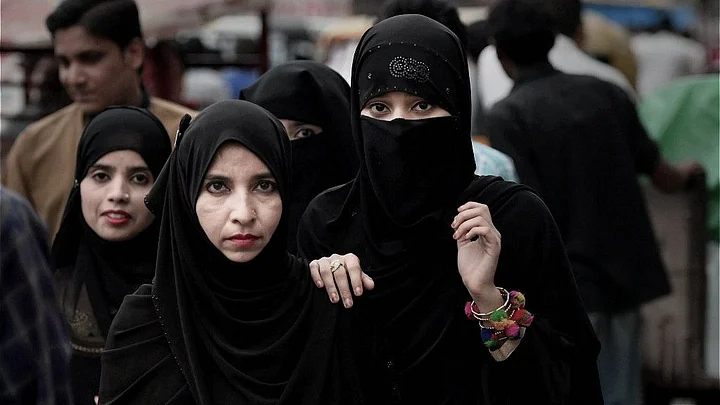As a young teenager, most of my life was semi-nomadic. Being an Army officer’s daughter meant moving home, schools and friends every two years. The 16-year-old me found myself in Chandigarh, surrounded by friends who were mostly Sikhs or Punjabis. It didn’t take long for me to start wearing a kada and sporting a miniature ‘kirpan’ locket strung on a black thread around my neck. I loved wearing these symbols of Sikhism. It wasn’t the religion I was born into. But no one ever stopped me from adopting parts of it for myself. Because Articles 25, 26, 27 and 28 of the Indian Constitution provide for freedom in professing, practising and propagating religion in India.
Let’s move backwards from there.
The Swarm of Saffron Shawls
Through the last few weeks, social media feeds have been flooded with videos from Udupi, Karnataka, showing young female students of the Muslim community pleading with school officials, teachers and administrators. They want to attend classes, they are concerned their examinations and studies will be impacted. And they are not being allowed in because they want to do that while wearing hijabs.
In retaliation to this, first, a large group of boys affiliated with a Hindutva outfit came to the college wearing saffron shawls. This was followed by other girl students sporting saffron shawls as they swanned into school. This item of clothing was apparently neither a security threat nor a political statement for anyone attending classes. Many of these girls who were now divided by the schism of their shawls and hijabs may have been friends only a few months back, sharing a laugh, notes from their registers and a happy acquaintance.
If Rules are Rules, What About Other Religions?
Many have sprung to the defence of the colleges and authorities, saying a uniform means everyone must look exactly the same, and in that sameness is the true virtue of schooling and equity.
I wonder if a young Sikh boy was asked to strip his turban off before attending class, what that would amount to – sameness or shaming? What about a little girl on whose forehead her grandparent would lovingly dot a Chandan teeka for good luck ? Maybe that should be scrubbed right off before she steps into a learning environment. After all, rules are rules, correct?
What Is This About ?
Two things are at play here.
One, it is the oppression of religious minorities, straight and simple. December saw Hindu vigilante groups storming into Christmas celebrations, denigrating school staff and children, disrupting whatever festivities were underway. January finds us shutting the doors of education on young Muslim students, isolating them and forcing them to choose between religion and submission to the howls of majoritarian hate.
Two, it is the intersection most gender conversations find themselves at – power and subjugation. Clothes and how women dress has always been a topic on which Indian men have had many vocal opinions. Ripped jeans? Problem. Short dress? Problem. Hijab? Problem. The problem then is not the item of clothing – it is the eyes that see it.
There is another grim outcome of this. An NSO report from 2020 indicates the literacy rate for Muslim women was higher than Dalit or tribal women, but lower than for women of any other religious group.
They are also, as the numbers bear out, a poorer community as a whole. According to the United Nations Development Programme (UNDP) and the Oxford Poverty and Human Development Initiative’s (OPHI) global multidimensional poverty index (MPI), 2018, one in three Muslims is multi-dimensionally poor. The term multidimensional points to indicators like nutrition, health and education along with income.
A Classic 'Lose-All'
Education is the first and most vital stepping stone to a better life. It is this belief that spurs countless Indian families to encourage their children towards better learning, saving and scrimping, so they can benefit from that important tuition and that vital book.
It’s the classic ‘lose-all’ for these young women. The duality is clear and present. The Beti Bachao Beti Padhao Campaign launched in 2017 is supposedly one of BJP’s headline campaigns. This is how it describes itself; ‘The Overall Goal of the Beti Bachao, Beti Padhao(BBBP) Scheme is to Celebrate the Girl Child & Enable her Education .The objectives of the Scheme are as under; Prevent gender biased sex selective elimination, Ensure survival & protection of the girl child and ensure education of the girl child.’
And yet, with the blessings of the state government, institutions can now move to stamp out the religious identity of these young girls and simultaneously, their access to education and emancipation.
Gates to schools have been shut for children across India for close to two years now. As they make the first tentative steps back to learning, it seems the concerted effort of our ruling dispensation is to ensure that some are held back, for good.
Why Is Religion In Political Office Acceptable?
A nation where a state Chief Minister is always dressed in saffron robes and refers to himself as a yogi or a monk, a nation where the Prime Minister – and other Chief Ministers – now hold public ‘yagnas’, temple prayers, donned in all the bells and whistles that accompany traditional Hindu attire, is that the country that is demanding these young school girls remove headgear that associates them with a particular religion?
I am not in favour of women being forced to wear a hijab – but that is my personal choice and this is theirs. We are both in equal measure, allowed to exercise our choice. And it’s not a whim. The Constitution allows it.
(Mitali Mukherjee has been a business journalist for the last 18 years. She is Consulting Editor, Business at Editorji. She tweets @MitaliLive. This is an opinion article and the views expressed are the author's own. The Quint neither endorses nor is responsible for them.)
